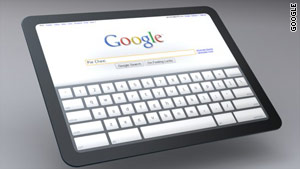Google narrowing Apple proprietary gap


It took years for the industry to come up with anything even close to the iPhone, and Apple raked in the profits from that. One-on-one, its designers and marketing people can beat anyone.
But Google and open source have changed the game. Combine an open source process with Chinese manufacturing, and Apple's best features can be copied, distributed, made and sold almost before Apple itself can get them out the door.
It doesn't matter if Apple patents the iPad software. Programmers can always find other ways to simulate functionality. There is more than one way to pinch a screen.
So Chrome, which last year was seen as a Netbook replacement, the long-awaited desktop Linux that works, is suddenly seen as an iPad replacement, at least a valid competitor.
Chinese manufacturers are showing screens ripped from laptops called iPad competitors. Within a week speculation has moved from how Apple will extend its lead to how Google will match it.
Throughout the last decade Apple had a secret sauce. It knew the customer. It did the design work, the marketing work, the channel prep, the hype. It made the deals with the guaranteed profits. Then it shipped the designs off to China and they came back profitable. It was good.
Well, game over. Google doesn't market as well as Apple. It doesn't design as well. It doesn't even take the risks of manufacturing and putting its brand name out there -- the Nexus One is an HTC product.
Yet still Google is eating Apple's cheese, first with the media and soon with the channel.
Jobs is boxed in. He can't wave an American flag over the iChrome because he's using Chinese manufacturers, too. He can't make a patent case, because the market will be gone before a case can come to trial. And he can't guarantee his partners fat profits, because mass cloning of features means there are no fat profits to be had.
The beneficiaries of all this are the same people who were being squeezed by Apple's dominance of the iPhone. Chinese manufacturers on the one side, American consumers on the other. Both now have alternatives.
And this is what open source does. It squeezes out monopoly profits of all kinds, including those resulting from innovation. It's evolution in action. And even Apple's business process is no longer enough to hold it off.
Yeah, if I were Steve Jobs, I would certainly call that evil.